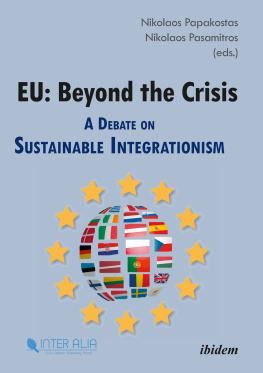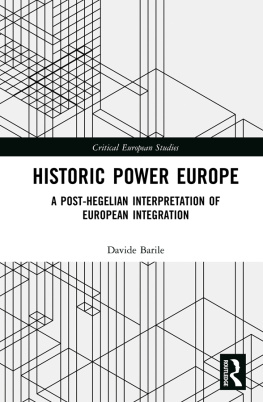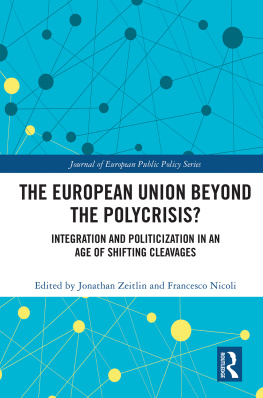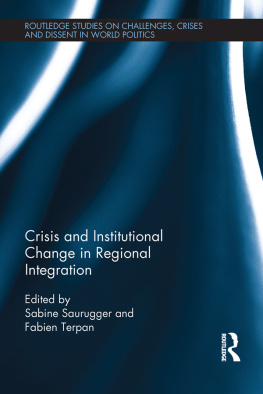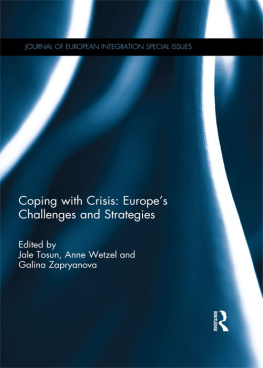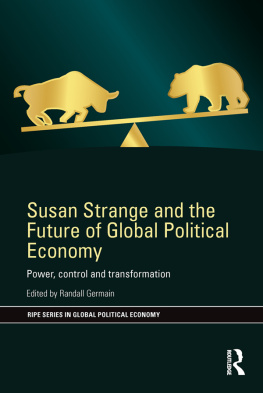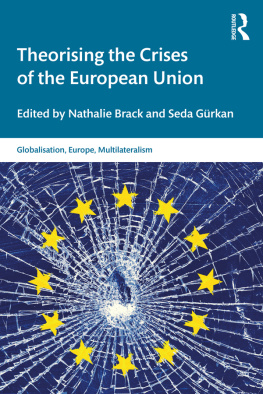The book you are holding in your hands is the result of a collective endeavour of the INTER ALIA Think Tank, ibidem - Verlag , the researchers / contributors, the editing team and the proof-readers.
Boyka Boneva , a founding member of the organisation that combines energy and hard work and offers them openhandedly to the INTER ALIA cause. Once again, she offered her best to her powers for the best possible outcome.
Max Jakob H o rstmann of the ibidem - Verlag . He is always available, open-minded and hardworking towards the finest outcome. All the ibidem people that worked for this book.
Dr. Apostolos Agnantopoulos , Vassiliki Delli , Dr. Alba Ferreri , Dr. Anna-Lena Hgenauer , professor George Kritikos , Max Lggert , Dr. Emmanuel Sigalas , Asimakis Tamourantzis . They are the quintessence of the volume. Their contribution is the materialization of an idea and at the same time, a meeting point for people that envision, believe and work for a Europe of constant betterment, tireless effort, vivid values, solidarist partners, team players and active citizens.
Dr. Babs Williams of Phoenix Social Enterprise, Dr. Jan Sanders from the Arcadia University Center , Athens and Alexia Eastwood
We thank you all for getting involved, working and believing in this volume. We hope the outcome meets your expectations and satisfies you.
We would also like to thank everyone that, directly or indirectly, supported us in the realization of the EU: Beyond the Crisis. Your contribution is greater that you may imagine.
All in all, Europe is our common home and we do the best we can, each one within his own powers, to make it livelier, more beautiful and more open and we are thankful for that .
Abbreviations
ALDE : Alliance of Liberals and Democrats for Europe
BL : Basic Law
CALRE : Conference of European Regional Legislative Assemblies
CCD-UDC : Centro Cristiano Democratico - Unione dei Democratici Cristiani e di Centro - Democratic Christian Centre - Union of the Democratic Christians and of the Centre
CDA : Critical Discourse Analysis
CDL : Casa delle Libert - House of Freedom
CoR : Council of the Regions
DC : Democrazia Cristiana - Christian Democracy
DEA : Directory for European Affairs
DEF Documento di Economia e Finanza - Economic and Financial Document
DFP : Decisione di Finanza Pubblica - Public Finance Decision
DG ECFIN : Directorate General for Economic and Financial Affairs of the European Commission
DIMAR : Dimokratiki Aristera (Democratic Left)
DPEF : Documento di Programmazione Economico-Finanziaria - Economic and Financial Planning Document
EC : European Commission
ECB : European Central Bank
EFSF : European Financial Stability Facility
EFSM : European Financial Stabilisation Mechanism
ELSTAT : Elliniki Statistiki Ypiresia (Hellenic Statistical Agency)
EMU : Economic and Monetary Union
EP : European Parliament
EPP : European People ' s Party
ESM : European Social Model
ESM : European Stability Mechanism
EU : European Union
EZ : Eurozone
GUE / NGL : European United Left / Nordic Green Left
FdI : Fratelli d'Italia - Brothers of Italy
FI : Forza Italia - Forward Italy
FLI : Futuro e Libert per l'Italia - Future and Freedom for Italy
GDP : Gross Domestic Product
IDV : Italia dei Valori - Italy of Values
IMF : International Monetary Fund
LC : Law on Cooperation
LN : Lega Nord - Northern League
LTRO (s) : Long-Term Refinancing Operations
M5S : Movimento Stelle - Five Star Movement
MEP (s) : Members of the European Parliament
MLG : Multi-level Governance
MoU : Memorandum( a) of Understanding
MP(s) : Member of the Parliament
NCD : Nuovo Centro Destra - New Centre Right
ND : Nea Dimokratia (New Democracy)
NEET : Not in Education, Employment, Training
NGO(s) : Non-Governmental Organization(s)
NPs : National Parliaments
OECD : Organization for Economic Cooperation and Development
OMC : Open Method of Coordination
OMT : Outright Monetary Transactions
PASOK : Panellinio Socialistiko Kinima ( Panhellenic Social ist Movement)
PD : Partito Democratico - Democratic Party
PdL : Popolo della Libert - People of Freedom
PIGS : Portugal, Italy, Greece, Spain
PM : Prime Minister
PNR : Programma Nazionale di Riforma - National Reform Program
PPG : Parliamentary Party Group
PS : Programma di Stabilit - Stability Programme
QMV : Qualified Majority Voting
RER : Rapporto sulle Riforme Economiche - Report on Economic Reforms
SC : Scelta Civica - Civic Choice
SEL : Sinistra Ecologia e Libert - Left Ecology and Freedom
SGP : Stability and Growth Pact
SMN : Subsidiarity Monitoring Network
SMP : Securities Markets Programme
SYRIZA : Synaspismos Rizospastikis Aristeras (Alliance of the Radical Left)
S & D : Social Democrats
TEC : Treaty of the European Community
TEU : Treaty of the European Union
TFEU : Treaty on the Functioning of the European Union
TSCG : Treaty on Stability, Coordination and Governance in the Economic and Monetary Union
VAT : Value-Added Tax
EU: Beyond the Crisis Foreword
NIKOS PAPAKOSTAS & NIKOS PASAMITROS
Almost six years after the eruption of the economic crisis, the European Union is still struggling to provide convincing answers that would b uild trust in the common future o f its member states and appease the international market, thus opening the way to normality at all counts. The profound effects of the crisis have necessitated a leap forward , that would irreversibly define the nature of the whole EU project. The policy of extending and pretending that has constituted an oblique economic and political advantage for the Union in the past , now seems unviable and needs to come to an end.
Europe cannot afford introversion. Diminishing competitiveness along with increasing political and economic assertiveness of other players (namely China and, to a lesser extent, Russia) and growing geopolitical unrest , challenge the leading position of the EU in the continent. Perceived as an economic institution , the EU cannot compete with China whose ample liquidity and lack of attached strings in the form of conditionality render it a much preferable partner for European states. Perceived as an envoy of a value system, the EU cannot compensate for its diminishing economic attractiveness as long as it is unwilling or unable to invest in its fundamental principles, such as respect for human dignity, liberty, democracy, equality, proportionality and subsidiarity.
The ongoing crisis has dealt serious blows to the foundations of the European Union and has exposed conceptual, political, economic and institutional weaknesses. While gaining a lot of a ttention throughout the past years, the financial aspect of the crisis seems to be manageable in the medium term. Regaining the trust of the market means regaining stability. Reversely, the social and political effects are gradually amplified. The enhancement of populism, nationalism and Euro- skepticism in Europe stems, to a large extent, from such political and behavioral inconsistencies. The inability of the European leaders and the current EU leadership to prove that their motives differ significantly and that the EU structure in its current form is viable, has resulted in osten sible reasonability of populist arguments.
Thus, another necessary discourse for the future of Europe relates to political pluralism. Euro- skepticism derives from other political powers and ideologies that have been held accountable for the eruption and escalation of the crisis, the stagnation of European integration process and the lack of a convincing alternative economic policy. It is essential to look into those political spaces, understand the reasons for their demise, and discuss improved alternatives.

